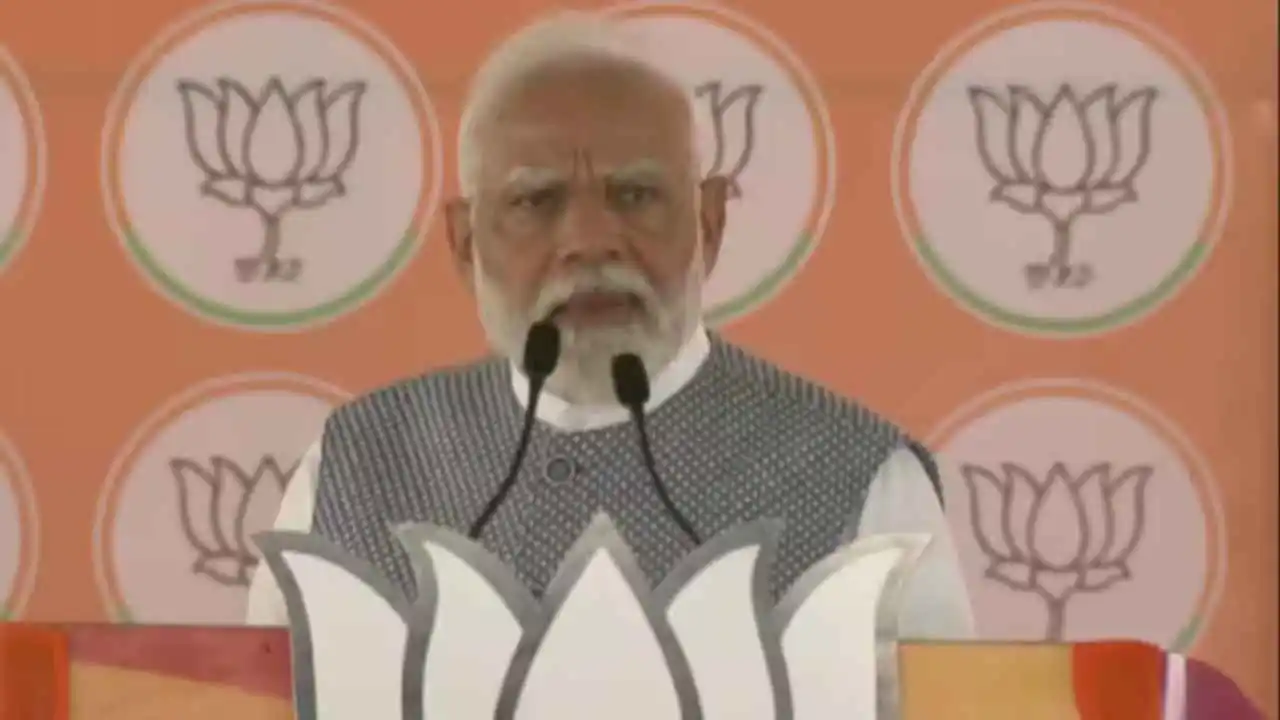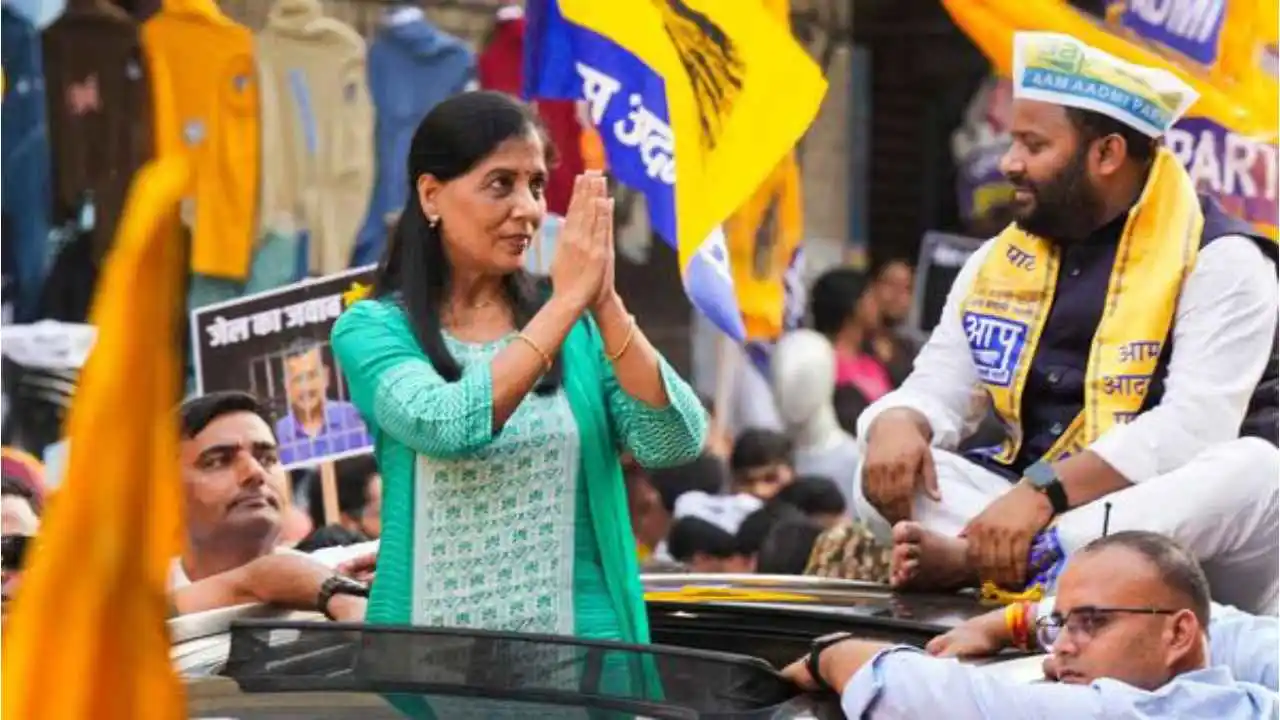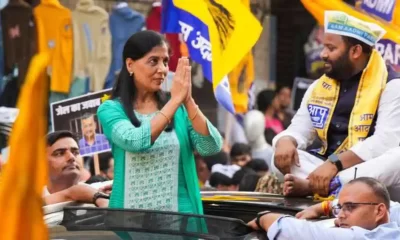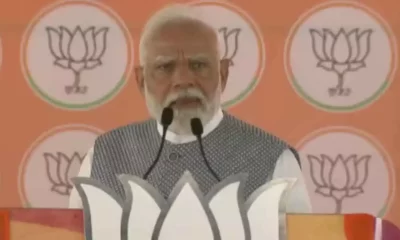India News
Sadhguru’s daughter shares health update after emergency brain surgery, says doing well and recovering quickly

Spiritual leader Sadhguru Jaggi Vasudev underwent emergency brain surgery at a private hospital in Delhi on Sunday, and well wishes for a speedy recovery were sent from all around the world.
A senior physician at Delhi’s Indraprastha Apollo Hospital said on Wednesday that the patient had experienced life-threatening bleeding in the skull but bow he is on the road to recovery.
His daughter Radhe Jaggi too gave an update on her father’s health and said he is responding to the treatment and is recovering from it.
Radhe Jaggi took Instagram stories today, saying, for those who are asking, Sadhguru is doing well and recovering quickly.
The Isha Foundation’s founder, Sadhguru Jaggi Vasudev, posted a video from his hospital bed in Coimbatore.
In the video that was uploaded to his Instagram account, Jaggi Vasudev, 66, said, the neurosurgeons at Apollo Hospital cut into his skull in an attempt to find something, but they discovered nothing at all, it was empty. They eventually gave up and fixed it. Here he is in Delhi with the patched-up skull but no damaged brain, he added.
After the procedure, Sadhguru was removed from the ventilator, according to the hospital, which also noted that he has improved vital signs and made steady improvement.
According to the hospital, the spiritual leader had been experiencing severe headaches for the last four weeks.
He carried out his regular daily routine, social engagements, and even performed the Maha Shivaratri function on March 8 despite the intensity of the pain. The senior consultant neurologist at the hospital, Dr. Vinit Suri, said in a video that the patient ignored all the pain and continued with all meetings.
But by the time the spiritual leader spoke with Dr. Suri on the phone on March 15, his headache became worse.
It further said that Suri quickly recommended an urgent MRI and suspected a subdural haematoma. The following day, the spiritual leader had a brain MRI, which showed extensive skull bleeding.
2024 Lok Sabha Elections
PM Modi criticises Rahul Gandhi for allegedly insulting Hindu kings, accuses Congress of not addressing atrocities by Muslim rulers
The prime minister was addressing an election rally in Karnataka’s Belagavi where he said, the statements made by the Shehzada of Congress have been made very thoughtfully to appease their vote bank. But the Shehzada does not utter a word about the atrocities committed by the Nizams, Nawabs, Badshahs and Sultans.

Prime Minister Narendra Modi on Sunday attacked Congress leader Rahul Gandhi for allegedly insulting Hindu kings but not saying a word on atrocities committed by Muslim rulers like Aurangzeb. The prime minister was addressing an election rally in Karnataka’s Belagavi where he said, the statements made by the Shehzada of Congress have been made very thoughtfully to appease their vote bank. But the Shehzada does not utter a word about the atrocities committed by the Nizams, Nawabs, Badshahs and Sultans.
Congress does not remember the atrocities committed by Aurangzeb who destroyed thousands of Hindu temples. He said Congress forms political alliances with parties who praise Aurangzeb. PM Modi said the Congress do not talk about all those who destroyed Hindu pilgrimage sites, looted them, killed Hindu people, and killed cows.
The Prime Minister was referring to a video clip of Rahul Gandhi which was shared by many BJP leaders. In the video clip, the Gandhi is heard saying, during the rule of Rajas and Maharajas, they could do whatever they wanted and even grab someone’s land. The Congress fought for India’s independence and brought democracy in the country.
PM Modi also mentioned the death of a Karnataka Congress corporator’s daughter, who was killed by her former colleague in her college. He said the Congress government gives priority to appeasement and for them, the lives of daughters like Neha have no value. The prime minister further added that the Congress is only concerned about its vote bank.
Neha Hiremath, daughter of Congress Councillor of Hubballi-Dharwad Municipal Corporation Niranjan Hiremath, was murdered on the campus of BVB College on April 18 by her ex-classmate Fayaz. PM Modi accused Congress for supporting anti national parties like PFI (Popular Front of India) for votes which is an anti-national organisation that gives shelter to terrorism and which has been banned by the Modi government.
India News
Delhi Congress President Arvinder Singh Lovely resigns, says he feels handicapped under Deepak Babaria’s leadership
Arvinder Singh Lovely pointed out many instances when party leaders objected to the way Deepak Babaria, the Congress’s general secretary in-charge for Delhi, conducted the state of affairs. Lovely said that he was under great pressure to expel the leaders who objected to Babaria’s ways.

Delhi Congress President Arvinder Singh Lovely on Sunday resigned from his post, citing interference by the party’s general secretary in-charge and alliance with the Aam Aadmi Party in Delhi as major friction points. In his resignation letter to Congress chief Mallikarjun Kharge, Lovely said he felt handicapped and unable to continue as the president of the Delhi Congress unit.
He pointed out many instances when party leaders objected to the way Deepak Babaria, the Congress’s general secretary in-charge for Delhi, conducted the state of affairs. Lovely said that he was under great pressure to expel the leaders who objected to Babaria’s ways. Arvinder Singh Lovely said the Congress’s alliance with the AAP in Delhi for the Lok Sabha elections, which he claimed was opposed by the Delhi Congess unit.
Lovely wrote in his letter to the Congress President that the state Congress Unit was against forming an alliance with the Aam Aadmi Party which was formed on the sole basis of levelling false, fabricated and malafide corruption charges against the Congress, and in turn, whose half of the cabinet ministers are in jail on corruption charges. He further called the alliance a compromise to improve chances of victory for the Congress.
Arvinder Singh Lovely said while he respected the Congress’s alliance decision with Aam Aadmi party but he was upset by Congress’s North East Delhi seat candidate Kanhaiya Kumar praising AAP chief Arvind Kejriwal. Lovely further said that according to the alliance, the Congress was allotted 3 Lok Sabha seats, of which 2 – North West and North East – constituencies were given to total strangers.
Udit Raj is a Congress-AAP joint candidate in North West Delhi, whereas Kanhaiya Kumar is contesting from the North East seat. Arvinder Singh Lovely said the announcement of Raj and Kumar as candidates had caused an uproar and protests by Delhi Congress leaders and workers within the party.
2024 Lok Sabha Elections
Sunita Kejriwal holds maiden Lok Sabha election roadshow in Delhi
Sunita Kejriwal will also hold a road show in West Delhi Lok Sabha constituency on Sunday. AAP party leaders said Sunita Kejriwal will also spearhead the campaign for AAP candidates in South Delhi and New Delhi constituencies as well as in Haryana, Gujarat and Punjab.

Aam Aadmi Party began its campaign for 3rd phase of Lok Sabha elections 2024 on Saturday with Sunita Kejriwal, wife of jailed Delhi Chief Minister Arvind Kejriwal holding a roadshow in Delhi. In a massive rally, Sunita Kejriwal was be seen standing on a vehicle holding her hands and greeting the people of the area. AAP’s East Delhi candidate Kuldeep Kumar was seen sitting on the vehicle as he showcased a portrait of Rani Laxmibai.
Earlier ahead of Sunita Kejrieal’s roadshow, Kuldeep Kumar told the media that Delhi Chief Minister Arvind Kejriwal who worked to provide the best school, and free- electricity to the people of Delhi has been framed in a fake case by BJP. Kumar further added that from today onwards Sunita Kejriwal’s roadshow will start and she is going to seek support and blessings from the Delhi people to continue its fight against the BJP government.
Aam Aadmi Party workers also staged a protest under the banner of Jail ka jawab vote se near Delhi’s Lakshmi Nagar area on Saturday against the arrest of Delhi CM Arvind Kejriwal in connection with an excise policy case.
After the Delhi CM’s arrest by the Enforcement Directorate (ED) in the liquor policy case in March, Sunita Kejriwal has taken up a more prominent role in campaigning activities for the Aam Aadmi Party. Since the Delhi CM’s arrest, Atishi and other AAP leaders have alleged that the arrest was made so that to the AAP Supremo can be prevented from campaigning for the Lok Sabha elections. Arvind Kejriwal has been sent to judicial custody until May 7.
Sunita Kejriwal will also hold a road show in West Delhi Lok Sabha constituency on Sunday. AAP party leaders said Sunita Kejriwal will also spearhead the campaign for AAP candidates in South Delhi and New Delhi constituencies as well as in Haryana, Gujarat and Punjab. She is emerging as a star campaigner for Aam Aadmi Party.
-

 2024 Lok Sabha Elections22 hours ago
2024 Lok Sabha Elections22 hours agoMallikarjun Kharge says candidates for Amethi, Rae Bareli seats in Uttar Pradesh will be announced in a few days
-

 2024 Lok Sabha Elections23 hours ago
2024 Lok Sabha Elections23 hours agoPriyanka Gandhi accuses BJP of planning to change the Constitution, criticises PM Modi for inflation
-

 2024 Lok Sabha Elections21 hours ago
2024 Lok Sabha Elections21 hours agoSunita Kejriwal holds maiden Lok Sabha election roadshow in Delhi
-

 India News3 hours ago
India News3 hours agoDelhi Congress President Arvinder Singh Lovely resigns, says he feels handicapped under Deepak Babaria’s leadership
-

 Cricket news4 hours ago
Cricket news4 hours agoIPL 2024: Rajasthan Royals beat Lucknow Super Giants by 7 wickets and 6 balls to spare
-

 2024 Lok Sabha Elections2 hours ago
2024 Lok Sabha Elections2 hours agoPM Modi criticises Rahul Gandhi for allegedly insulting Hindu kings, accuses Congress of not addressing atrocities by Muslim rulers
-

 Entertainment29 mins ago
Entertainment29 mins agoHappy Birthday Samantha Ruth Prabhu: Social media wishes Queen of South Indian Cinema on her 37th birthday




